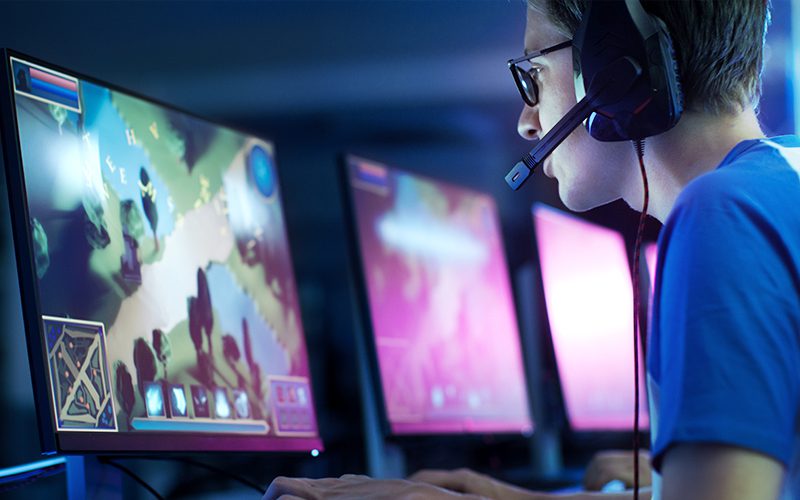During an intense game of FIFA 18 soccer, you’re running down the field with the goal in your sites. You’re in the clear, you line up the perfect shot, and then … nothing. Your player freezes while the opposing team steals the ball and you (maybe) resist the temptation to throw your controller across the room. Let’s face it—as a gamer, you’ve probably been there.
You may call it lag or latency, but many factors can affect the quality of your gaming experience. While it’s tempting to blame your PC or video game console, it’s much more likely that poor internet speeds are the problem. So how can you figure out the best internet speed for gaming?
Check your computer
No matter how fast your internet connection may be, an older computer or out-of-date drivers may not support it. Whether your gaming PC is a desktop or laptop, check these features when buying or updating.
- Graphics card (GPU): This is the keystone of your gaming computer. Make sure you have a GPU with at least 4GB of its own dedicated video memory (VRAM).
- Processor (CPU): Since your computer’s processor controls everything except the graphics, it needs to be as good as possible. A minimum Intel Core i5 is workable, but a Core i7 is better. Plus, a quad-core CPU will increase your performance speed over a dual-core. Quad-core allows your system to perform more tasks simultaneously, so the tasks get completed faster.
- Clock speed: The operating speed of a computer’s microprocessor is called the clock speed. A CPU with higher clock speed numbers equals faster gaming speeds.
- RAM: You need a minimum of 8GB of RAM but aim for 16GB if you can.
- Storage: Solid-state drives (SSD) are the new darlings of the gaming world because of their lightning-fast file transfer speed. However, if you have an older computer, or an SSD is out of your price range, you can still get faster game loading. Just make sure you have at least a 1TB hard drive with a speed of 7200rpm. If you do get a computer with an SSD, don’t save your games there. Use the standard hard drive for your software and files. Save the SSD for the system and processing.
Test your speed
If you suspect your internet speeds aren’t as good as they could be, run a speed test. The cause of slower internet speeds might be:
- A router isn’t configured correctly or blocks some types of connections.
- Too many devices are connected and take up all the bandwidth.
- You’re playing against distant opponents, creating a signal send and return rate—called the ping rate—higher than 100 to 150ms.
Rev it up!
Once your gaming system is sorted out, make sure your internet connection is, too. Gaming specs say a download speed of 3Mbits and an upload speed of 1Mbit are required to play most games. Why? Because these are the minimum required speeds to play on PS4 and Xbox One. However, a high-speed internet connection gives you a better gaming experience.
Different technologies can connect your games to the internet. Not all these services are available in all areas, so research to find out which services have the fastest speeds in your neighborhood.
- Fiber optic cable: Since it uses light to transmit data, fiber is the fastest and most stable connection available. A service like AT&T Fiber℠ 1000 gives you up to 125Mbit download speeds (1,000Mbps) and lets you connect 14 devices at a time.
- Coaxial cable: Cable usually gives gamers fast speeds and stable connections, but sometimes the quality varies depending on the ISP.
- DSL: Connected through your phone line, DSL speeds can theoretically go as high as 100Mbit. However, speeds are usually slower in real life, depending on the service provider.
- Satellite: Although a connection can be made from almost anywhere, satellite service is usually expensive and can have lower speeds.
Should you go wireless?
You get a router for your home whenever you order internet service. Your gaming devices and PCs use this router to connect to the internet. Most routers give you the option of using a wired connection through an Ethernet cable or a wireless connection through Wi-Fi®.
If your gaming system is close to your router, a wired connection is fast and stable with fewer disconnections. However, if you have a strong Wi-Fi signal, a wireless connection can be just as fast and stable as a wired one. Plus, you don’t have to worry about hiding cords or tripping over them. Just make sure no walls or appliances are causing interference.
The play’s the thing
Remember, not all games need a high-speed internet connection. If you’re a fan of Candy Crush or Hearthstone, basic internet service should be perfect for your needs. But if you’re a fan of high-end, multiplayer games like Star Wars Battlefront or Elder Scrolls Online, investing in high-speed internet service like AT&T Fiber can save you a lot of frustration. And maybe even prevent the destruction of innocent controllers. To learn more and get help with setting up you gaming system, go to the AT&T Community Forums.
If you enjoyed this post, you might also want to check out this article on how fiber internet might be able to improve your gaming experience.
This article is AT&T sponsored content written by Allison Jewel, a TechBuzz contributor and AT&T employee. The statements in this article are her own and don’t necessarily represent the positions, strategies, or opinions of AT&T.





